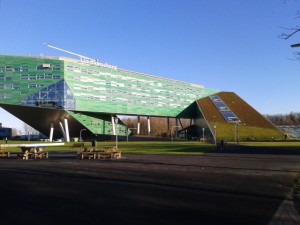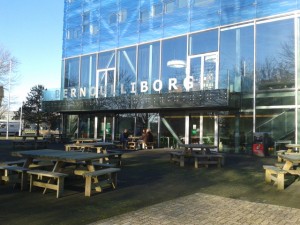
Researchers are often accused of working in “ivory towers” separated from the real world. Perhaps planning suffers less from this syndrome since it is firmly rooted in practice. But most universities still retain strong boundaries between academic teaching and learning units. Even in an interdisciplinary field like planning, efforts must be made to exchange ideas and achieve some sort of synergy between different groups. While the Department of Geography, Planning, and International Development at the University of Amsterdam seems to have these internal boundaries between groups, several key efforts have been made to link our work to that of others.
Last week several researchers from our transport planning group joined researchers at the Rijksuniversiteit Groningen for a unique exchange. A few years ago, our professors Luca Bertolini and Jos Arts discovered that the two departments had a lot in common, and they decided it would be a great idea for the researchers and students to meet up and discuss their ideas. This week’s exchange was the seventh such workshop between the two groups of transport planners. The workshops are organized by two students, one from each school, twice a year.
From Groningen, Assistant Professor Eva Heinen presented her latest research proposal to study cycling in the Netherlands. PhD student Ori Rubin discussed travel trends among family members visiting each other, concentrating on parents visiting their children, children visiting their parents, and siblings visiting each other. PhD student Niels Heeres encouraged discussion on what makes a focus group or a workshop: is one a data collection technique and the other a learning opportunity? Or are both research methods, one centred on a particular issue and the other seeking to develop knowledge or skills? Masters student Marije Hamersma presented some fascinating insights from her study of people living near highways at two Dutch sites–a surprising 80% of people she surveyed had no problem living in these areas, and about 20% chose the location for proximity to the highway.

From Amsterdam, PhD student Els Beukers discussed her research on cost benefit analysis as a tool that is problematic for many planners. Her research sought to bring together planners and evaluators to discuss some of the problems they had with cost benefit analysis; the Dutch government requires cost benefit analysis as the final step in approving land use-transport plans for federal funding. Els, Luca, and several other researchers at the University of Amsterdam are attempting to change the policy planning process through these types of projects: bringing together planners, policy makers and members of other professions to hear about innovative practices, reflect on them and try to develop their own policy and plans in focus group sessions. Can planners stage workshops that act in the same way as public health introduces interventions? Andrew Switzer, who is studying transitions to car use in Zurich and Munich for his PhD, hopes to use insights on this historical shift to learn how to shift current trends towards alternative transport modes. Postdoctoral researcher Lucas Harms has been mining data to explore demographic patterns in cycling in the Netherlands, including what percentages are due to population growth, increased distances, or increased trips. Although cycling has increased in the Netherlands in general, it has changed more rapidly in certain age groups and certain regions of the country.
This exchanged offered us the opportunity to hear what others are working on in planning and mobility issues, discuss methods and approaches, and our connection to planners. While Groningen researchers seem more linked to national agencies and organizations, at Amsterdam we tend to meet with local and regional stakeholders. The mix of qualitative and quantitative methods to explore these issues was also interesting, so much that we decided to devote our next meeting to mixed methods approaches. I only wish we had annual exchanges of this type within our own department–I’d love to know what the economic geographers and international development researchers are working on. But we’ll stick to interuniversity exchanges for now: in January we’ll host researchers from the University of Alborg, Denmark in a similar exchange.

Jeez, I go away on exchange for a semester and the department decides to hire a Vancouverite? Looks like we’re slowly but surely taking over. Hopefully your Dutch lessons are going swimmingly!
…lol not sure about taking over, there’s only two other Canadians in planning at GPIO! But there do seem to be more of us around. Are you back in Vancouver for the semester?
Nope. I’m in Hong Kong this semester on exchange (I’m in the Research Masters in Urban Studies programme, aiming for a PhD position at the UvA next year), heading back to the Left Coast on Monday for a month, then back to Mokum. If you need anything from Vancouver (maple syrup, Canucks memorabilia, sushi that isn’t awful, a can of anything from Granville Island), you know how to find me. And, in complete seriousness as a displaced Vancouverite, consider a biertje in the future already purchased!